Let’s put gender equality at the heart of building back better
Edited on
08 March 2021URBACT expert Sally Kneeshaw gives us her recommendations for how gender equality should be made a key part of cities’ Covid recovery.
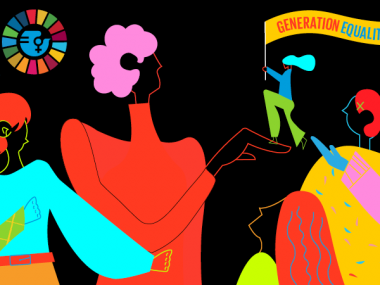
Two years ago on International Women’s Day (IWD), URBACT launched the Gender Equal Cities report to highlight what can be done at the local level to reduce gender-based inequalities. Last year, we published an article about the gendered impacts of Covid-19. This year, we want to mark IWD (8 March 2021) by starting to look forward and show how our understanding of Gender Equal Cities can usefully inform the Covid recovery in cities across Europe.
This article sets out a series of concrete suggested actions that cities can take to make sure the post-pandemic recovery puts the needs of women and girls at its heart, based on the lessons and knowledge developed by URBACT and its partners.
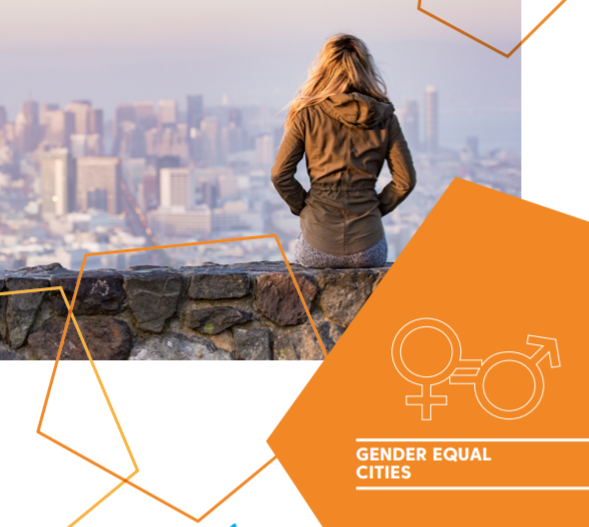 Gendered impacts of Covid-19
Gendered impacts of Covid-19
Before we look ahead, it is important that we remind ourselves of the gendered impacts of the current and ongoing crisis. Unfortunately, without knowing it, the observations we made last year were only at the start of the pandemic, which has exacerbated so many pre-existing social and systemic barriers to women’s empowerment. Across the world, women are facing increased domestic violence, unpaid care duties, unemployment and poverty.
Job losses appear to be hitting traditionally female sectors – such as retail and service industries – harder than others; whilst part-time and flexible work – more often held by women – has been shown to be more precarious. On the other hand, male dominated sectors, such as construction and tech, have been less impacted and are likely to benefit from further stimulus in recovery funds.
Outside the world of work, the burden of additional caring responsibilities has been placed disproportionately on women, and the forced retreat of many women into the private sphere at home has undermined their ability to take part in civic and political life – as well as subjecting all too many to additional personal risks and distancing them from their support networks.
But there have also been positive signals in the past year. We have the 1st woman Vice President of the United States – a woman of colour creating a powerful role model for younger generations. Women scientists are leading vaccine and healthcare teams across the world, and several popular female leaders, like Jacinda Ardern in New Zealand and Sanna Marin in Finland, have received praise for their handling of the pandemic response. For women in many sectors, the mix of measures forced on us by the pandemic, such as remote and flexible working, could be maintained in ways that create enabling conditions to help us advance in the workplace.
It is in this context that UN Women made the theme for IWD 2021 ‘Women in leadership: Achieving an equal future in a Covid-19 world’: “Women stand at the front lines of the Covid-19 crisis, as health care workers, caregivers, innovators, community organisers and as some of the most exemplary and effective national leaders in combating the pandemic. The crisis has highlighted both the centrality of their contributions and the disproportionate burdens that women carry.”
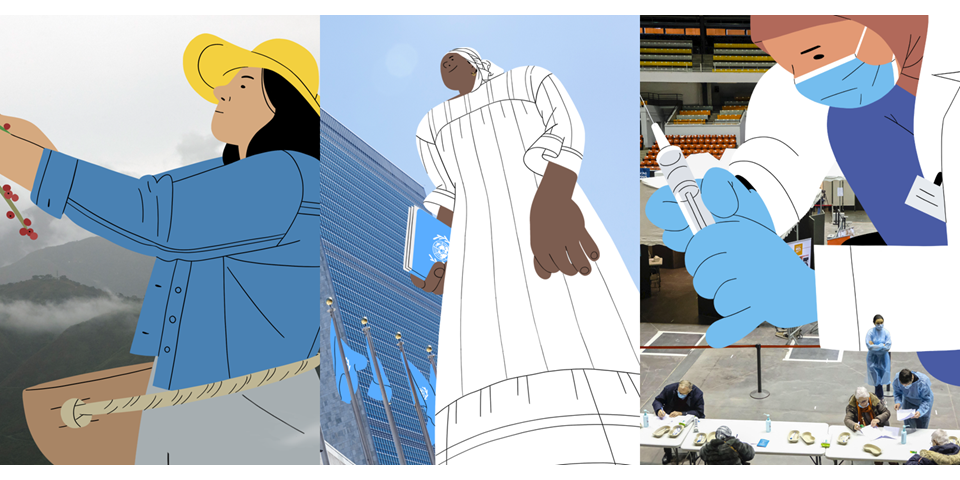
Photo credit: Illustration: Alva Skog; Photo: Ryan Brown & Franck Chapolard & Alamy Stock Photo / UN Women
How cities can take action for a more equal recovery
The work of rebuilding our economies and our societies following the impact of Covid-19 must include acknowledging the gendered impacts of the crisis – along with the many pre-existing gender-based inequalities – and seeking appropriate means to address these in ways that benefit all of us.
Thankfully, work that URBACT undertook with its partners prior to the pandemic already gives us a lot of knowledge and even more inspiration from a gender equality perspective. As we look towards the recovery phase, we are able to make a series of specific recommendations that cities should undertake in order to put gender equality at the heart of building back better.
Actions for cities:
- Appoint a ‘recovery czar’ at local level, whose remit has gender equality at its core.
- Be conscious of who is at the table making policy and ensure balanced gender representation.
- Invite gender experts and organisations representing women and girls to your local stakeholder group.
- Make specific efforts to hear the voices and needs of the most marginalised and vulnerable women, being aware of the intersections with factors such as age, ethnicity, poverty and disability.
- Push for percentage targets for women businesses and workers in bailouts and recovery funds, such as the EU Recovery and Resilience Facility.
- Make sure gender budgeting principles are integrated to show how public recovery and other funds benefit women.
- Develop targeted initiatives, such as training, access to finance, gender sensitive procurement to empower women to contribute to economic recovery. Studies show gender equality increases GDP and job creation.
- Make sure local supply chains guarantee that women workers have access to decent work, social protection and equal opportunities.
- Invest in social infrastructure such as childcare, mobility, health services, parks and cultural facilities that support families and enable women to participate on an equal footing in the labour market and public life.
- Ensure financial safety nets are in place for those in most need, for instance in relation to food poverty and housing.
- Focus on the education of girls and women and the development of their leadership skills.
- Address the physical and mental health needs of women and girls emerging from lockdown.
Key principles underlining these recommendations are the importance of improving representation of women in decision-making and gender-disaggregated data for accelerating new, more equitable models of urban services in the recovery. These recommendations from URBACT also resonate in the work of our partner organisations.
“Women and girls’ voices in all their diversity need to be heard, including in decision-making, now more than ever. We need sex-disaggregated data collection on the disease itself, economic impacts, care burden, incidents of sexual violence and abuse, and crisis recovery – and at all levels of governance.” European Institute for Gender Equality (EIGE)
The Vice-Chair of CEMR’s Standing Committee for Equality, Emil Broberg, has called for “specific measures to be taken and for recovery programmes to be allocated in a gender-balanced manner. Austerity policies in the past have proven harmful to women, for example in the cuts to public sector workers which impact women disproportionately. These problems must be dealt with at the local level.”
Recommendations built on a wealth of URBACT knowledge
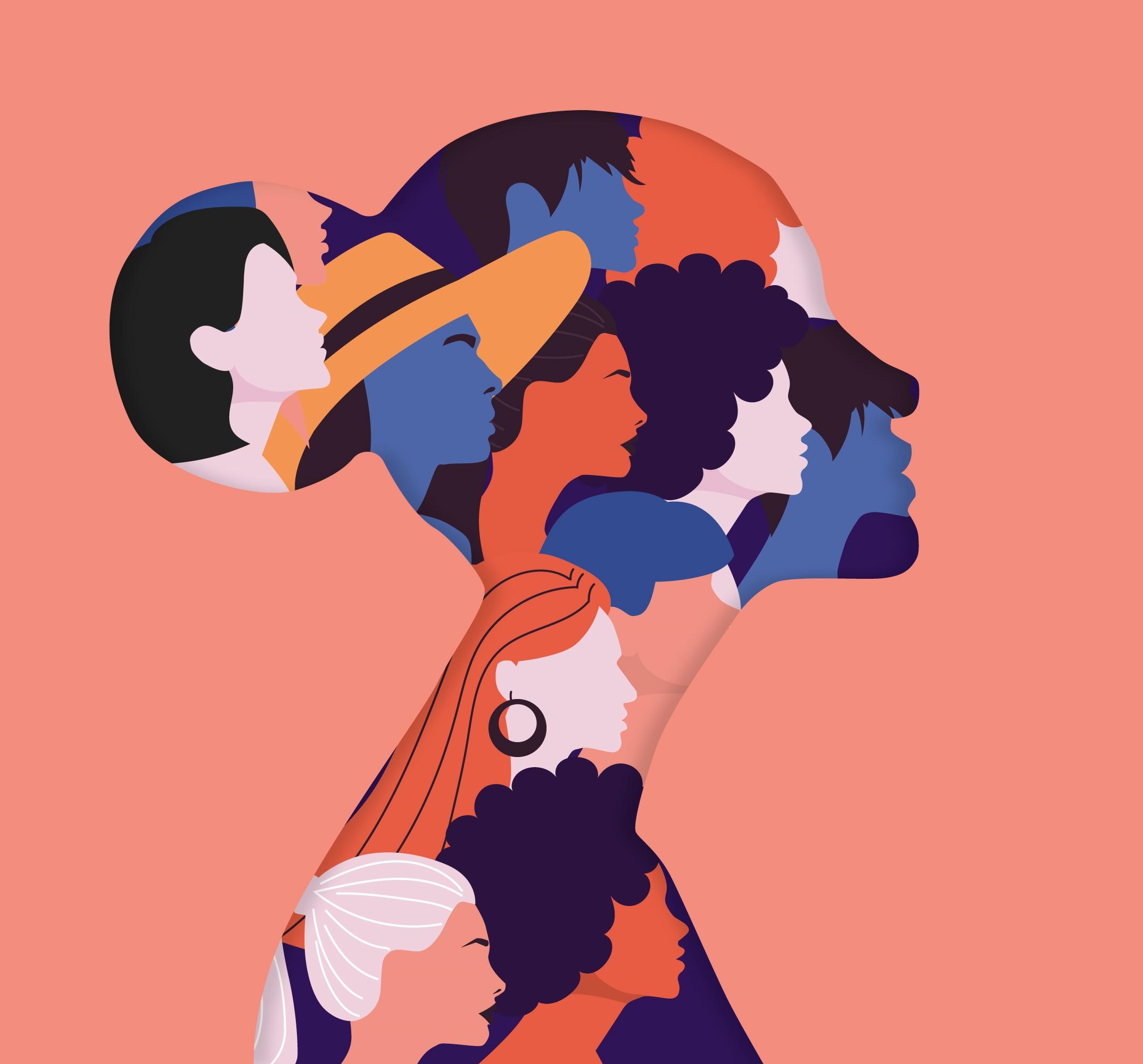 As stated above, these recommendations are based on the knowledge and inspiration of a number of activities by URBACT and its partner organisations over recent years, including the Gender Equal Cities report produced in collaboration with CEMR.
As stated above, these recommendations are based on the knowledge and inspiration of a number of activities by URBACT and its partner organisations over recent years, including the Gender Equal Cities report produced in collaboration with CEMR.
Cities have shown inspiring practices in the field of gender equality during the pandemic. For example, in Frankfurt (DE) - a signatory of the CEMR Charter for Equality of Women and Men in Local Life -- the Social Service departments agreed to provide additional emergency capacities at short notice for women facing violence at home during lockdowns and emergency places for women’s shelters. They also developed a campaign to raise awareness of stereotypes and violence and insults women face in the street: “Cliche-free zone” www.klischeefreie-zone-ffm.de with posters created by young women.
The URBACT Gendered Landscape network continues to explore gender equality and gender mainstreaming as central to a more global understanding of how different structures connect and interact within urban policymaking and practice. In the past year, the network has delved into cross-cutting issues like mobility (see articles) and intersectionality.
In the coming year, network cities will continue to pilot interesting gender actions. Trikala (EL) is planning a pop-up intervention in an urban space, and Barcelona Activa (ES) is opening a space dedicated to facilitating women entrepreneurship associations and organisations to meet and collaborate. As always, the results of these experiences will be shared with cities through URBACT channels.
Renewed efforts in 2021
In 2021, as the recovery gets underway, URBACT will re-launch its Gender Equal Cities workstream to build capacity and share knowledge about gender mainstreaming across our networks and beyond.
Our partners are also planning related efforts:
- CEMR is celebrating the 15th anniversary of its ‘European Charter for Equality of women and men in local life’ in 2021 and will review its strengths/weaknesses to incorporate possible amendments (including related to Covid).
- The European Institute for Gender Equality is currently conducting a study on gender-responsive public procurement and will launch a toolkit later in the year. This could potentially complement URBACT’s existing knowledge and capacity building on public procurement.
So, on International Women's Day 2021, as we make a renewed commitment to Gender Equal Cities, we invite our networks and partners to share that pledge, to get in touch and to share your inspiring examples for an equitable recovery.
Cover photo credit: UN Women/Yihui Yuan
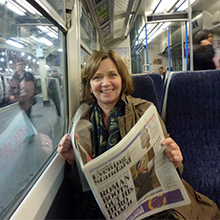 Submitted by Sally Kneeshaw on
Submitted by Sally Kneeshaw on




